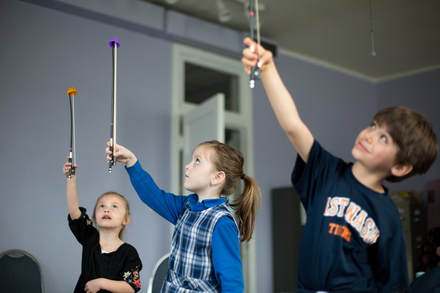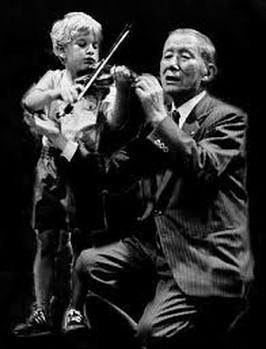The Studio

Ohse Violin Studio is a growing community of young violinists and families studying the Suzuki Violin Method in Nashville, TN. Each student (and parent) receives weekly private and group lessons for an immersive musical experience. Through song, movement, stories and games, children develop focus and ability in an engaging and positive environment, paving the way for excellent technical and musical fluency. Through the study of music, students develop character, communication skills, grit, and empathy along with a deep appreciation for music and community.
The Suzuki Philosophy

Shin'ichi Suzuki was a violinist, educator, philosopher and humanitarian. Born in 1898, he studied violin in Japan for some years before going to Germany in the 1920s for further study. After the end of World War II, Dr. Suzuki devoted his life to the development of the method he calls Talent Education. Suzuki based his approach on the belief that “Musical ability is not an inborn talent but an ability which can be developed. Any child who is properly trained can develop musical ability, just as all children develop the ability to speak their mother tongue. The potential of every child is unlimited.” Dr. Suzuki’s goal was not simply to develop professional musicians, but to nurture loving human beings and help develop each child’s character through the study of music.
The Suzuki Method
There are 4 significant elements that differentiate Suzuki lessons from traditional music lessons...
- Parental Involvement - As when a child learns to talk, parents are actively involved in the musical learning of their child. They attend lessons, take notes, and learn the instrument with the child so that they may serve as effective 'home teachers' during the week. The parent and teacher work together to create a positive, musically rich environment and develop the child's focus and ability.
- Listening and learning by ear- Listening is the primary means through which we learn language and music. In the Suzuki method, teachers do not teach students the pieces. Instead, students internalize and audiate pieces through home listening. The teacher's job is to help the student figure out the skills she needs to play the music she hears in her mind.
- Review Review Review! - You never "finish" a piece, but continue to review and refine it. When young children learn to speak, they do not discard old words when they learn new ones. They increase their vocabulary, gradually using words in new and sophisticated ways. Every piece in Dr. Suzuki's graded repertoire introduces a new concept or skill. The child continues to practice and review old pieces while he learns new repertoire in order to develop and refine his technique, gradually gaining mastery of his instrument.
- Group Lessons - Children learn most from other children. Group lessons provide a motivating opportunity for students to learn and play together. It also fosters a strong community of hardworking, dedicated families. Students and parents who attend regular group class are more likely to succeed and continue their musical education long term.

